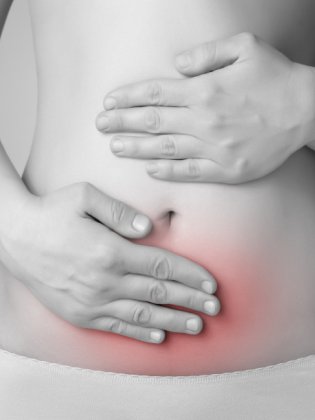
Endometriosis
What is endometriosis?
Endometriosis is a gynecological disorder characterized by the presence of cells of the endometrium, the glandular lining of the uterine cavity outside the uterus.
It is a condition that affects 5-10% of women and its prevalence in patients with infertility is around 15-20%.
It is a multi-factorial condition caused by the combined effects of hormonal factors related to menstruation, genetic and environmental factors, and requires multidisciplinary treatment.
Which areas can be affected by endometriosis?
Most endometrial glandular cell “grafts” are carried out on the organs surrounding the uterus: the uterine ligament bases, the lining of the uterus, the ovaries, the bladder, or the colon.
These endometrial glandular cells depend on the hormonal cycle: thus, with each cycle, the lesions are likely to “bleed”, causing pain and chronic scarring of the surrounding tissues.
When endometriosis lesions reach the fallopian tubes or ovaries, they can also be a cause of infertility.

What are the symptoms of endometriosis?
The abnormal implantation of endometriosis in several organs outside the uterus has two main consequences: pain and infertility. These symptoms make diagnosis is very complicated, and often late, with a delay in treatment that can take up to 6 - 10 years from the onset to diagnosis.
The symptoms of endometriosis are a consequence of the very nature of the condition and the location of the endometriotic lesions, either in the uterus or in the organs surrounding the uterus in the pelvic cavity.
The most indicative symptoms are:
- Painful menstruation (dysmenorrhea)
- Discomfort or pain during sexual relations (dyspareunia)
- Pelvic pain or sometimes back pain when the endometrium has moved to the back of the uterus.
All the other symptoms are linked to the varying locations of endometriosis: they may be urinary pain, digestive pain, or unsystematic abdominal pain.
An indication of endometriosis is usually its prevailing cyclical during menstruation, which is a warning sign that points to the presence of endometriosis. The condition can also be asymptomatic.
It is important for the doctor to assess not only the pain, but also the intensity, as well as the personal and professional impact of the endometriosis condition. The diagnosis is genuinely underestimated in young women. Diagnostic examination is very important, and it should seek to clarify elements such as: maternal history, school absenteeism, previous effectiveness of conventional analgesic drugs or hormonal treatments such as estrogen-progestin pills.
As part of the infertility check-up, these indicative symptoms consistent with endometriosis are routinely checked.
What are the risk factors?
Women with endometriosis are more likely to have problems with allergies, food intolerance, asthma, thyroid problems or migraines.
Also found are:
- A family history of endometriosis, particularly from the mother.
- A generally lower body mass index, especially in adolescents, and often more frequent declining weight fluctuations, especially in the case of ovarian endometriosis or deep pelvic endometriosis.
- Genetic or environmental susceptibility factors, which are difficult to pinpoint precisely.
- Factors that may contribute to the genesis and persistence of endometriosis, which could be numerous:
- High estrogen levels in the uterine area and in the blood.?
- Abnormal immune response.
- Genetic abnormality that may explain the familial forms of the disease.
- Localized chronic pelvic inflammation.
- Increased concentration of pollutant and toxic “endocrine disruptors”, such as Bisphenol A, pesticides.
Other studies also suggest a link between endometriosis and depressive syndromes, although a cause and effect relationship has not been formally established.
Recent studies suggest a significant link between endometriosis and certain autoimmune diseases, such as systemic lupus erythematosus, multiple fibrosis, rheumatoid arthritis, and chronic inflammation of the colon.
How is endometriosis diagnosed at the American Hospital of Paris?
It is mainly acute or chronic pain syndroms or infertility problems that prompt patients to consult.
- Our Gynecology department has 5 consultation offices that offer initial endometriosis diagnosis and treatment.
- In our Medical Fertility Assistance departement, endometriosis-like symptoms are routinely checked during infertility check-ups.
In these two cases, the diagnosis will be based on the patient's interview and clinical examination. The various departments within the hospital regularly take part in multidisciplinary consultation meetings during which proposals for medical treatment, surgery or in-vitro fertilization protocols are discussed.
The diagnosis of endometriosis is based on two imaging scans:
- Pelvic ultrasound
- Pelvic MRI when deep endometriosis is suspected.
These examinations are carried out on the spot in our Imaging department by radiologists specialized and recommended in the study and treatment of endometriosis.
What are the various treatments available at the American Hospital?
The care and treatment of endometriosis at the American Hospital of Paris is multidisciplinary and involves several specialists depending on the symptoms and the severity of the disease: doctors who specialize in pain management, gynecological surgeons, urological surgeons, and digestive surgeons.
If you were diagnosed with endometriosis, your referring doctor will provide you with informed information on the different treatment options and different possibilities for treatment, depending on the effectiveness of previous treatments, the intensity and nature of the pain, the severity and location of the endometriosis, and the patient's expectations with regard to a possible desire for pregnancy.
1. Analgesics and therapeutic non-drug alternatives:
After evaluation of the pain and its impact on personal life, conventional analgesic treatments will be prescribed after specialist advice. The tolerance and the beneficial results of these treatments will be assessed as the condition progresses. Prescriptions of non-steroidal anti-inflammatory drugs should be avoided.
Non-drug treatment options will also be offered in the context of specific consultations, including acupuncture, osteopathy, yoga.
2. Hormonal treatments
3. Surgical treatments
The choice of surgical treatment will be made after a multidisciplinary meeting. If surgery is necessary, our team of specialized surgeons will arrange for treatment (mini-invasive laparoscopic surgery, robot-assisted surgery or specialized surgery in the urological or digestive field).
During endometriosis surgery, the laparoscopic approach is recommended.
